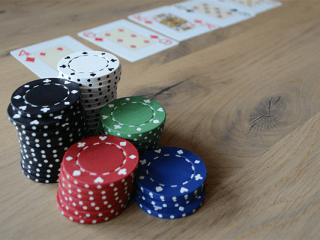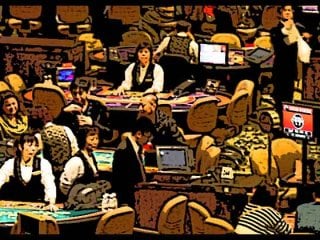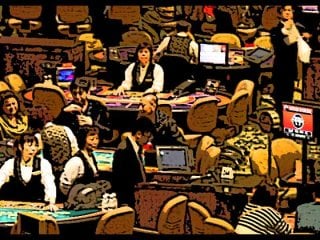Poker Etiquette – The Unwritten Rules of Poker
By Alex Smith, Last updated Mar 22, 2024

Poker is an incredibly popular casino game, and it’s also a social game. The entire point of the game is to win money from other players, so it’s only natural that there are rules to keep things civil at the table.
However, along with enforceable rules, there’s also a pretty long list of etiquette points you should be aware of. While not all of these are actual rules at the table, you could find the table quickly turning against you if you break them!
Let’s look at some of the unwritten rules to remember when playing poker!
1. No Angle Shooting
Angle shooting is one of the most controversial topics in poker, and some land-based casinos have even created rules to target angle shooters specifically. In short, angle shooting occurs when a player makes an intentional, unethical move to take advantage of less experienced players or a specific situation.
It’s virtually impossible to run through the different angle shooting scenarios, but a few are more common than most. For example, if a player tries to look at another player’s hole cards sneakily, that’s considered an angle shot in the poker world.

$ 35 for USD /CAD
No Maximum
40 x
No code required
–
–
Yes
Get $9,750 in free bets with Casino Max’s amazing welcome offer. 325% match for your 1st, 2nd and 3rd deposits.
Crypto Deposit: $10+ for a 350% bonus
All Deposits: $35+ for a 325% bonus
Wagering: 40x
– Total Maximum Bet is $10
– Bonuses will automatically be removed at the point of requesting a withdrawal

$10; $20 if depositing via BTC
N/A
20x (deposit+bonus)
–
–
$110
Yes
If you intentionally act out of turn to try and get valuable information about your player, that’s another intentional and unethical move. Hiding your chip stack so that other players don’t know how much money you have at the table is another form of angle shooting.
Poker players all make mistakes, and most casinos and poker rooms give you the benefit of the doubt most of the time. However, if something continues, the casino may well take action. Penalties for angle shooting can include a verbal warning to a one-round penalty.
2. Never Slow Roll Other Players at the Poker Table
Slow rolling is one of THE worst things you can do at the poker table, and unfortunately, virtually no land-based casinos have rules against it. However, it’s widespread, and there’s footage of a professional poker player doing it quite a lot!
When you play poker, and a player has a clearly-winning hand at the showdown, it’s common courtesy to turn that hand over and reveal a win.
If you fail to do so, it’s simply a matter of disrespect; you’re making the other poker players think they may have won when in reality, you KNOW you have the best hand. This is one of the most common things that start arguments and fights while playing poker.
Always show your hand promptly and avoid slow-rolling. It may be one of the many unwritten rules of the game, but a slow roll is looked upon very unfavourably by other players, and it could lead to the rest of the table refusing to continue playing with you if you do it repeatedly.
3. Don’t Waste Time Playing Poker
Ask most poker players what they hate most at the table, and a vast number of them will tell you it’s players taking too long. There’s nothing worse than playing at a table where one player continues to drag out the gameplay.
Of course, it’s OK to take your time when you have a really important decision to make. However, if you keep taking minutes to make apparent decisions, then you’ll be causing great annoyance to the rest of the table. Good poker etiquette means you can take your time with each hand but not overdo it. If you know you’re going to fold, fold. If you know you’re going to call, call.
This is one of the significant benefits of playing online poker; all poker sites automatically place a cap on the amount of time you can take per hand, and it’s very often just 10-20 seconds. This means that action continues to move quickly and ensures that other players can’t constantly slow down the game deliberately.
4. Avoid Calling the Clock Unless it’s Necessary
We’ve just talked about one of the most critical pieces of poker etiquette; not taking too long when the action is on you. However, there’s another element to this: not to call the clock on other players too early. As a poker player, you have the right to call the clock on any other player. When you do this, the player is given 60 seconds to finish their turn. Otherwise, their hand is mucked.
This is rarely a big problem, but some players get too trigger-happy when calling the clock. You need to be prepared to give players the time they need to decide on their hands — and you should treat all other players at the table with respect.
Of course, don’t be afraid to call the clock if your opponent is taking the mick. But remember, everyone else is playing with real money, too (especially at cash games), and they likely want to think their decision through before rushing into anything!
5. Act in Turn When You Play Poker
Acting out of turn at the poker table is when you decide on your hand before it’s your turn. You can avoid this by paying attention to the game you’re playing and not getting distracted by things like your mobile device.
When you play poker at a land-based casino, there’s always that one person who keeps forgetting to put their ante bet in or who keeps calling (or raising) out of turn. While it’s a harmless mistake, for the most part, those who continue to do it are breaching poker etiquette, and it can become annoying for other players.
If it happens too much, players can even get penalties from the croupier or the floor manager.
6. Remain Silent When Not in the Pot
Another excellent example of poker etiquette is keeping quiet when you’re not involved in a pot. It’s OK to have conversations at the table; for the most part, it’s encouraged. However, there’s nothing worse than being involved with a large pot only to find someone at the table who keeps talking and distracting you.
You should try to avoid talking with other players involved in a hand you’re not in, but you should also be mindful of what you’re talking about when you have conversations. You don’t want to accidentally influence the pot by discussing your cards or what you think other players may be holding.
7. Don’t Reveal Your Cards While Others Are Still Playing.
This is a pretty important part of poker etiquette; even if all of the action has finished and all remaining players have gone all-in, you should STILL avoid showing or declaring your hand. While it can be pretty tempting to show what you had — letting the table know you folded what would have been the nuts, for example — this is generally bad poker etiquette.
After all, the other players still involved with the hand don’t want to know that they have fewer options to hit the cards they need if they’re still waiting for more cards to be dealt.
However, this rule becomes even more critical while there’s still action going on. It’s incredibly bad to tell the table what cards you have while a hand is still going on. Doing so will likely earn you a penalty from the dealer, and repeated offences could result in you being told to sit out for an entire round.
8. Respect Other Players
Poker can be quite a strenuous game. While it’s designed to be fun because there’s real money involved, it’s only natural that emotions will run wild at the table from time to time.
When playing poker in a live environment, you often sit with other players for hours on end. This means that any grudges can dampen the mood of the entire table, and if you find yourself getting irritated or annoyed by other players, it can even affect your play.
If you’re finding one of the other players at the table to be annoying, the best thing you can do is just to ignore them. Plug your headphones in if you have them available, or find another way of distracting yourself from what they’re doing or saying.
Of course, this goes both ways; you should also be mindful of the other players at the table. While it can be tempting to gloat when you win a big pot, remember that your big win has come at someone else’s expense.
Similarly, if someone makes a mistake, remember that they’re likely not doing it on purpose. You should remain calm, collected, and in control when you’re at the poker table. If you feel yourself getting agitated, it’s best to walk away for a few minutes to clear your head.
Another thing to bear in mind when it comes to respecting other players; is to try to avoid giving unsolicited advice about what you would have done in a specific situation. You may think you’re being friendly and conversational, but it’s the last thing someone wants to hear after losing a big pot.
Respect at the poker table goes both ways, and if you can remember to do this when you sit down at the table, you’ll have a much more enjoyable experience overall.
9. Don’t Complain About Bad Beats
Poker is a skill-based game, but there are elements of luck involved. As a result, it’s only natural that bad beats will occur from time to time. This WILL happen to you when you’re playing, and while it can be tempting to unleash your frustration, the other players at the table don’t want to hear it.
What’s more, if you appear visibly frustrated about the result of a hand, other players may be able to use this information against you. They may feel that you’re ‘on tilt,’ which could drastically affect how they play against you.
If you care about pride, then it’s also worth noting that players who constantly cry about bad beats show the rest of the table that they simply don’t understand how poker works. It’s a natural part of the game; sometimes, it works in your favour. Other times, it doesn’t.
Again, if you’re feeling irritated or agitated, it’s best to take a short break from the table. Go and grab a bite to eat, go for a cigarette, or sit down to browse Instagram for 15 minutes. This will allow you to regain your composure.
10. Make Your Chips Visible
Whenever you’re involved with a big pot, or a significant decision, you will always want to know how many chips your opponent has. This can have a significant impact on your decision-making. For example, if a player has fewer chips, it’s easier for you to push all-in as you’re not risking as much money.
It’s standard practice at all land-based poker rooms that your big chips should be displayed at the front of your stack. This means that all players at the table should be able to see how much money you have in front of you.
It’s incredibly bad etiquette to hide your big chips where other players can’t see them. Players can complain to the dealer about this, and they will tell you to move them into view.
Players are allowed to ask you how many chips you have; however, provided your chips are visible, you are under no obligation to answer.
11. Avoid Poker Coaching at the Table
It can be irritating when someone at the table tries to teach others how to play. It’s condescending and inappropriate. Even when someone makes a visible mistake, there’s no point in pointing it out. If they’re a complete beginner and you genuinely feel you may need help.
If you do want to give advice to another player at the table, it’s best to wait until you’re alone with them away from the table. They probably don’t want to feel humiliated at the table, and this is exactly what they might feel if you start telling them how to play.
12. Don’t Do a Hit and Run
Cash games are all about trying to win as much money as possible. However, you don’t want to be that player that does a hit and run. This means that when you win a big pot, you stand up right away and take your chips with you.
The reason why this is considered to be lousy etiquette is that it’s very annoying to all players — especially those who just lost the pot. They want a chance to win their money back! Of course, you are free to leave whenever you want, but you should try to avoid leaving straight away.

$ 35 for USD /CAD
No Maximum
40 x
No code required
–
–
Yes
Get $9,750 in free bets with Casino Max’s amazing welcome offer. 325% match for your 1st, 2nd and 3rd deposits.
Crypto Deposit: $10+ for a 350% bonus
All Deposits: $35+ for a 325% bonus
Wagering: 40x
– Total Maximum Bet is $10
– Bonuses will automatically be removed at the point of requesting a withdrawal

$10; $20 if depositing via BTC
N/A
20x (deposit+bonus)
–
–
$110
Yes
13. Don’t Splash the Pot
Hollywood movies have a habit of glamourizing poker in ways that simply aren’t realistic. For example, you’ll often see players throw all of their chips into the middle of the table when they’re calling an opponent. While this may look cool on screen, in practice, it’s terribly bad etiquette, and it can even get you a one-round penalty from playing at the table!
Always make sure that any chips you put into play don’t touch the chips in the middle. This makes it easier for the dealer to keep track of things and ensures the game continues at a steady, uninterrupted pace.
Poker Related Articles
How Does a Casino Make Money on Poker?
It will come as no surprise to learn that online poker sites and online casinos are in the business of making money; that’s their ultimate goal, and while many of these sites may offer attractive – and lucrative – bonuses and promotions designed to temp in new players, the ultimate goal is to generate as much revenue as possible.
How to Play Slow Roll Poker
The goal of poker is to beat your opponent; in fact, doing so is actively encouraged! However, while you should always try your best to throw your opponents off-balance and coerce them to make mistakes
What is the Dead Man’s Hand in Poker?
The deadman’s hand is one of the most iconic hands in poker. While some players have slightly different definitions of the dead man’s hand, most people regard it as a hand containing two Aces and two Eights – equalling two pairs. However, while the hand may look quite simple, there is much more to meet the eye.
What Happened to Mike Matusow
If you’re wondering what’s actually happened to Mike Matusow – and want to know what this colorful character is up to these days – keep reading to find out what this star poker player is up to these days!
How to Play Red Dog
Red Dog, also known as Red Dog Poker, is quite a popular game. Today, you will find it offered at most online casinos. Some land-based casinos also offer it, although it’s not found as commonly.




 Top 5 casinos
Top 5 casinos 

